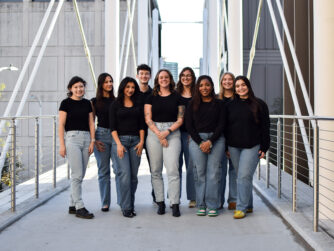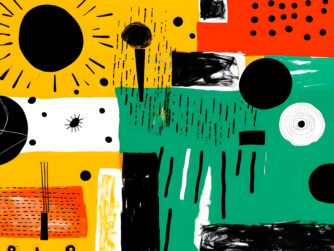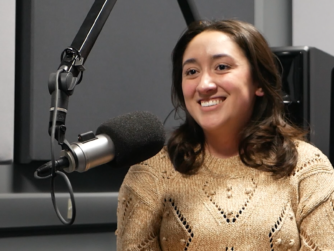Mikayla Mondragon would come home from long school days to sit with her family and watch the evening news.
“My parents always had it on because they’re news freaks,” she said. The daily tradition introduced her to journalism, Mikayla’s future major at the University of Texas at Austin.
“Oh, you’re going to be the next Barabra Walters!” her parents said when she chose to study journalism. However, Mondragon wasn’t interested in being on the evening news; she said she was interested in a more creative form of storytelling: podcasts.
“Podcasts are much more conversational and much more personable than things on a page,” Mondragon said.
Mondragon grew interested in podcasts after taking a class called Digital Storytelling with journalism professor Robert Quigley.
There, she heard about The Drag, Quigley’s audio production house, and learned about its true-crime podcast called “The Orange Tree.”
“My mom is a true-crime nerd, so in addition to watching the news, she would also watch ‘48 hours’ or ‘60 minutes,’” Mondragon said. “That was my mom’s idea of a Friday night.”
She said her mother often used true crime to give Mondragon life lessons. While watching a show together, Mondragon said mother would say “don’t do stupid things, otherwise you’re going to end up like her!’”
Mondragon listened to the first episode of “The Orange Tree” in her Audio Storytelling class, and she couldn’t help but think about her mother. “They were trying to portray that this could happen to any girl,” Mondragon said. “That reminded me of what my mom used to tell me, like, ‘This could end up happening to anybody. You could end up dead.’”
Being an avid reader and jack of many trades, Mondragon is pursuing certificates in creative writing and elements of computing along with her career in journalism.
Mondragon grew up on YA novels and is still a “huge book nerd.” “That’s why I’m doing the creative writing minor,” she said, “I think it’s so cool and it’ll help with journalism, too, because you want to tell a story.”
When selecting core science classes, Mondragon said she took a computer science class and loved it.
“I think of it like a game. You have to figure out what’s missing in order for something to pop out on the screen.” She said she was intimidated by the thought of writing code from scratch but that “once you get the pattern down, you can manipulate patterns to do what you want.”
Working for The Drag, Mondragon uses her wide range of talents to do “a little bit of everything.” She said at first she only knew about “The Orange Tree,” but she was excited to hear about the wide range of stories that The Drag is working on beyond the true-crime podcast.
Mondragon said she couldn’t believe that people her age — who were working on such large-scale audio production projects — could also develop a strong sense of community within The Drag.
“We can talk to each other with slang, with emojis. There are no boundaries, and I like that,” Mondragon said. “I don’t want to be in some rigid job, I want to be in something fun where I can talk to my coworkers like people.”
“I knew it was something I wanted to do.”









